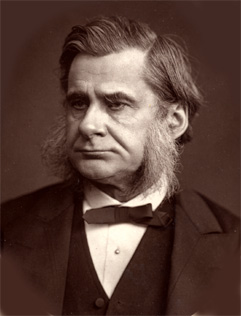Origine: Da Science and Education, p. 141; citato in William Boyd, Storia dell'educazione occidentale (The History of western education), a cura di Trieste Valdi, Armando Editore, Roma, 1966.
Thomas Henry Huxley frasi celebri
Origine: Citato in James Dewey Watson, In principio fu il Verbo o il Dna? http://www.corriere.it/Primo_Piano/Documento/2005/09_Settembre/28/index.shtml, Corriere della Sera, 2 gennaio 2006.
Origine: Citato in Augusto Camera e Renato Fabietti, Corso di storia.
Origine: Thus, whatever system of organs be studied, the comparison of their modifications in the ape series leads to one and the same result—that the structural differences which separate Man from the Gorilla and the Chimpanzee are not so great as those which separate the Gorilla from the lower apes. (da Evidence as to Man's Place in Nature, cap. 2, § 123 https://en.wikisource.org/wiki/Evidence_as_to_Man%27s_Place_in_Nature/Chapter_2#123)
Origine: Da On the Hypothesis that Animals are Automata, and Its History; citato in Jeffrey Moussaieff Masson e Susan McCarthy, Quando gli elefanti piangono, traduzione di Libero Sosio, Marco Tropea Editore, Milano, 2010, p. 288. ISBN 978-88-558-0143-0
Origine: Citato in Mario Livio, Cantonate, Rizzoli, Milano, 2013, p. 123. ISBN 978-88-17-06748-5
Thomas Henry Huxley: Frasi in inglese
Thomas Henry Huxley. "Lectures on Evolution Title: This is Essay# 3 from" Science and Hebrew Tradition." (1882); as cited in: William Trufant Foster, (1908) Argumentation and debating, p. 55
1880s
1860s, A Liberal Education and Where to Find It (1868)
Letter to E. Ray Lankester (11 April 1892) Huxley Papers, Imperial College: 30.448
1890s
Origine: 1860s, Evidence as to Man's Place in Nature (1863), Ch.2, p. 85
“Try to learn something about everything and everything about something.”
A favourite comment, inscribed on his memorial at Ealing, quoted in Nature Vol. XLVI (30 October 1902), p. 658
1890s
"Agnosticism and Christianity" (1899) http://aleph0.clarku.edu/huxley/CE5/Agn-X.html
1890s
Origine: 1860s, Evidence as to Man's Place in Nature (1863), Ch.2, p. 92
About Richard Owen's view on human and ape brains, in a letter to J.D. Hooker (27 April 1861) http://aleph0.clarku.edu/huxley/letters/61.html
1860s
"Geological Reform", Quarterly Journal of the Geological Society of London, Vol. 25 (1869); as reprinted in Huxley, Discourses, Biological and Geological essays (1909), pp. 335–336
1860s
Review in the Daily News (17 October 1871), quoted in Life and Letters of Thomas Henry Huxley F.R.S (1900) edited by Leonard Huxley, Vol. 1, p. 452
1870s
1860s, Reply to Charles Kingsley (1860)
1880s, On the Reception of the Origin of Species (1887)
“Abram, Abraham became
By will divine
Let pickled Brian's name
Be changed to Brine!”
Poem in letter Joseph Dalton Hooker (4 December 1894) in response to hearing that Hooker's son had fallen into a salt vat. Huxley papers at Imperial College London HP 2.454
1890s
“I do not advocate burning your ship to get rid of the cockroaches.”
Said in reference to those who wished to abolish all religious teaching, rather than freeing state education from Church controls, in Critiques and Addresses (1873) p. 90
1870s
1860s, Reply to Charles Kingsley (1860)
Origine: 1860s, Evidence as to Man's Place in Nature (1863), Ch.2, p. 75
Origine: 1860s, Evidence as to Man's Place in Nature (1863), Ch.2, p. 131-132
1860s, Reply to Charles Kingsley (1860)
1870s, On the Hypothesis that Animals are Automata, and Its History (1874)
Origine: 1860s, Evidence as to Man's Place in Nature (1863), Ch.2, p. 125
Origine: 1860s, Evidence as to Man's Place in Nature (1863), Ch.2, p. 73
“The man-like Apes… have certain characters of structure and of distribution in common.”
Origine: 1860s, Evidence as to Man's Place in Nature (1863), Ch.1, p. 34
1860s, Criticisms on "The Origin of the Species" (1864)
Origine: 1860s, Evidence as to Man's Place in Nature (1863), Ch.2, p. 115
If I confine my retrospect of the reception of the 'Origin of Species' to a twelvemonth, or thereabouts, from the time of its publication, I do not recollect anything quite so foolish and unmannerly as the Quarterly Review article...
Huxley's commentary on the Samuel Wilberforce review of the Origin of Species in the Quarterly Review.
1880s, On the Reception of the Origin of Species (1887)
Aphorism #367, in Aphorisms and Reflections (1907) http://aleph0.clarku.edu/huxley/Book/Aphor.html edited by Henrietta A. Huxley, his widow
1890s
Origine: 1860s, Evidence as to Man's Place in Nature (1863), Ch.2, p. 110
Origine: 1860s, Evidence as to Man's Place in Nature (1863), Ch.2, p. 89
1860s, On a Piece of Chalk (1868)
